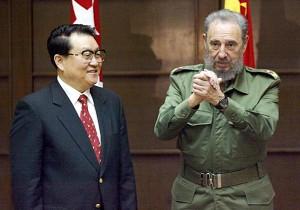Since September 2004, four former committee members of the Henan Provincial Discipline Inspection Commission have accused Li Changchun, a member of the Central Political Bureau of the Chinese Communist Party (CCP), of dereliction of duty. Top CCP officials continue to use the excuse of “maintaining a balance of power” to protect Li. Recently, several high-ranking officials have given repeated hints that Li may stay in power through his next term.
Li Sued in Supreme Court
The four members who brought charges against Li Changchun include the deputy of the Henan Provincial Discipline Inspection Commission and the current consultant of the Henan Provincial Discipline Inspection Commission. They claim that Li’s negligence during his six-year term (1991–1997) as the Henan Provincial Party Committee governor led to the spread of the AIDS epidemic in China’s Henan Province.
The charge was filed with the Politburo and the standing committee of the People’s National Congress. The Central Commission for Discipline Inspection finally brought this trial to the People’s Supreme Court.
The same four members again filed charges against Li in the People’s Supreme Court in 2006. This suit accused him of severe negligence of duty that resulted in hundreds of thousands of new HIV infections and more than 17,300 deaths due to AIDS.
Six Indictments of Li
Li indicted on six charges. These are:
- Concealing the spread of the AIDS epidemic throughout Henan Province.
- Failing to report his knowledge of the proliferation of theAIDS epidemic to the State Council, which severely violates the rule that any serious, unexpected, contagious, or malignant disease is to be reported to the council overseeing a region.
- Failing to take any action after the epidemic was brought his attention.
- Rejecting Henan Party Committee and Health Department members’ request that he place the AIDS epidemic situation on the agenda of the Provincial Party Committee. Li used the excuse that, “We have to figure out the priority of 90 million people vs. 4,000 persons.”
- Submitting false reports to the State Council claiming AIDS patients had been provided with appropriate medical treatment and that the epidemic had been contained, in 1995 and 1998.
- Having neglected, deceived and as the primary leader of the province, dismissed the epidemic as unimportant, which resulted in the spread of AIDS to 15 counties, spanning 39 villages and infecting more than 220,000 people.
The Politburo’s Bias Favor of Li
The Politburo dispatched delegates to meet with the four former Discipline Inspection Commissioners on three separate occasions to dissuade them from enlarging the issue. The delegates claimed that the top CCP authorities favored Li for four reasons. One, the Henan Provincial CCP Committee and authorities should bear the responsibility for gross negligence of duty. Two, the central regime has already paid attention to every accusation brought to high-ranking officials and discipline department. Three, Li has already reflected on his mistakes, and four, the central and Henan authorities have taken proactive countermeasures to contain the further spread of AIDS. Necessary financial and medical resources have also been provided.
Li’s accusers continue to point out that Li’s negligence cost tens of thousands of people their lives and brought turmoil to their families. Yet, Li was not punished, but promoted to the top level of the CCP.
Li Is the Focus of Disputes Among the CCP Elite
Li’s retention has been the focus of disputes between top party authorities because it directly impacts the arrangements for Zeng Qinghong, a member of the Secretariat of the CCP Central Committee, and Jia Qingling, the Chairman of the National Committee of the Chinese People’s Political Consultative Conference. If Li is dismissed, Zeng and Jia will have to struggle to hold their current positions. The first criterion of the CCP’s personal deployment is to evaluate whether a candidate shares common political interests with the core management, while dereliction of duty and moral degeneration are considered “minor.” Zeng and Jia have strongly opposed punishment for Li in order to protect their own interests. Despite the CCP’s nonstop boast about “ruling for the people,” the “balance of power” within the CCP is the foremost consideration when dealing with Li’s situation.
CCP Releases Message Calling for Li’s Retention
Recently, the Politburo and the working unit for the seventeenth National People’s Congress have begun airing information concerning Li’s retention in the inner circles of the National People’s Congress, the People’s Political Consultative Conference, and the Secretariat of the CCP Central Committee.
The information claims that Li has reflected on his behavior and even requested a just punishment. It concluded that Li is responsible and dedicated, based on his past performance and contributions to propaganda, communist theories and communist organizations. It also emphasizes that all circles agreed with the CCP elite’s recommendations after listening to various opinions.
However, each of the eight Democratic Parties in China have indicated that it is “hard to rationalize” why the CCP wants to keep Li in power. The mainstream opinion among the senior officials and departments of the central regime is that Li should be dismissed from his position. Yet, Li’s is almost assured the retention of his position because the Politburo wishes to balance power internally.

